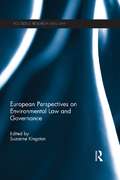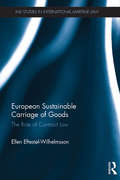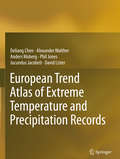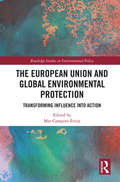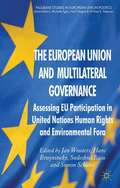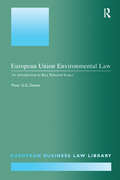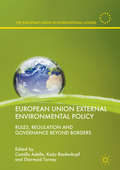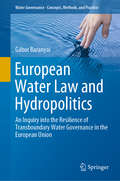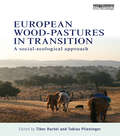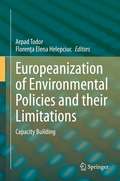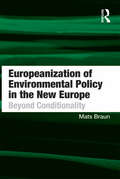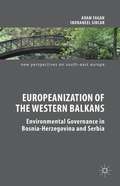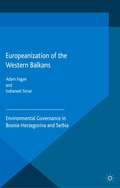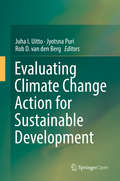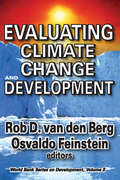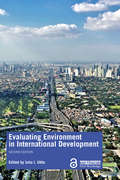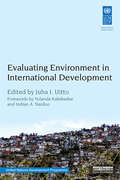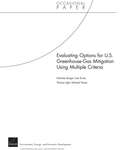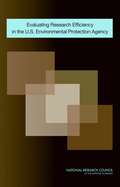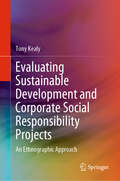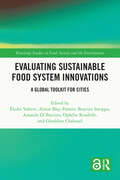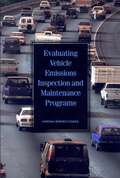- Table View
- List View
European Perspectives on Environmental Law and Governance (Routledge Research in EU Law)
by Suzanne KingstonThis book provides a range of perspectives on some of the most pressing contemporary challenges in EU environmental law and governance from some of today’s leading European environmental academics and practitioners. The book maintains a focus on three key cross-cutting issues, each of which is carefully analysed through the lens of governance. The first theme to be addressed is that of climate change and the problems it poses for EU governance. The second issue explored concerns the challenge of integrating environmental considerations into other policy areas, as is required by the Treaty on the Functioning of the European Union and the EU’s Charter of Fundamental Rights. Finally, the third theme centres on the important challenge of improving environmental enforcement within the EU, and considers issues such as the Aarhus Convention and the evolution of the Commission’s work on implementation and enforcement throughout the past twenty years. Each of these three themes is situated within the broader ongoing debate about the changing nature of European environmental governance post-Lisbon and the ways in which developments in this area fits within broader trends in European governance theory and policy generally. European Perspectives on Environmental Law and Governance contains contributions from experts in the field including; Mary Robinson, Alan Boyle, Ludwig Kramer and Liam Cashman, and will be of interest to academics, students and practitioners of EU environmental law.
European Sustainable Carriage of Goods: The Role of Contract Law (IMLI Studies in International Maritime Law)
by Ellen Eftestøl-WilhelmssonThis work discusses the rapidly developing European transport policy on sustainable freight and the connected efforts initiated by the European Commission (EC) on greening transport by the means of contract law. Greening transport has been a central goal for the EU for decades. The main problem has been, and still is, that far too much carriage of goods within the EU is performed unimodally: by road carriage alone. This has caused severe problems particularly in central Europe, where both trade and environment is suffering from an ineffective transport industry with growing problems of congestion and pollution. A modal shift in transport from mainly road based to a form of transport in which more environmental friendly modes such as rail, inland waterways and sea born transport are integrated into one transport chain, is hence an objective of the EU. If successful, this model could then be extended to the international transport community. The key question raised in this book is whether the traditional role of contract law is changing to such an extent that the parties involved must take external interests into account. In the case of the EU’s efforts to enhance sustainable carriage of goods within its realm, the author explores whether governmental interference is necessary, or if we can trust that the parties will integrate environmental issues into their contracts because there is a demand for such clauses. The different proposals for an EU regime on multimodal contracts of carriage are discussed in this context. This book will be of great relevance to academics and practitioners with an interest in EU law, transport law, environmental law and maritime law in general.
European Trend Atlas of Extreme Temperature and Precipitation Records
by Deliang Chen Alexander Walther Anders Moberg Phil Jones Jucundus Jacobeit David ListerThis Atlas presents records of climatic variability and change in Europe starting before 1901 and focuses especially on trends of extreme temperatures and precipitation. The authors have used software developed within EMULATE (European and North Atlantic daily to MULtidecadal climATE variability) to obtain the extremes indices and temporal trends. The trend atlas provides an easy way to identify spatial patterns for a given time period, region, season, and index. The Atlas clearly shows that climate in Europe has changed over the last 100 to 150 years, such that the occurrence and intensity of warm temperature extremes have increased. Precipitation extremes have also changed, but with a less clear pattern compared to the temperature extremes.
The European Union and Global Environmental Protection: Transforming Influence into Action (Routledge Studies in Environmental Policy)
by Mar Campins EritjaThis book examines how the EU can be a more proactive actor in the promotion of the principles of sustainability and fairness from a legal environmental perspective. The book is one of the results of the research activity of the Jean Monnet Chair in EU Environmental Law (2017-2020) funded by the European Commission under the Erasmus+ programme. The European Union and Global Environmental Protection: Transforming Influence into Action begins with an introduction of the key EU competences, instruments and mechanisms, as well as the current international challenges at the EU level. It then explores case study examples from four regulated fields: climate change, biodiversity, multilateral trade, unregulated fishing, and access to justice; and four unregulated areas: mainstreaming of the Sustainable Development Goals in EU policies, and environmental justice, highlighting the extent to which the EU might align with international environmental regimes or extend its normative power. This volume will be of great relevance to students, scholars, and EU policy makers with an interest in international environmental law and policy.
The European Union and Multilateral Governance
by Jan Wouters Hans Bruyninckx Sudeshna Basu Simon SchunzAn interdisciplinary approach to the study of the EU in UN human rights and environmental governance which addresses the legal and political science dimensions. With contributions from academics and policy-makers, this volume is a comprehensive analysis of how the challenges it faces impact on the EU's position in UN fora.
European Union Environmental Law: An Introduction to Key Selected Issues (European Business Law Library #7)
by Peter G.G. DaviesThis comprehensive book provides analysis and discussion on the following key issues in EU environmental law: environmental competence, principles and objectives, implementation and enforcement, nature protection, impact assessment, trade and the environment, waste management, climate change and the EU. An accessible work for all students of the subject both academic or professional.
European Union External Environmental Policy
by Camilla Adelle Katja Biedenkopf Diarmuid TorneyThis book considers the environmental policies that the EU employs outside its borders. Using a systematic and coherent approach to cover a range of EU activities, environmental issues, and geographical areas, it charts the EU's attempts to shape environmental governance beyond its borders. Key questions addressed include: What environmental norms, rules and policies does the EU seek to promote outside its territory? What types of activities does the EU engage in to pursue these objectives? How successful is the EU in achieving its external environmental policy objectives? What factors explain the degree to which the EU attains its goals? The book will be of interest to students and academics as well as practitioners in governments (both inside and outside of the EU), the EU institutions, think tanks, and research institutes.
The European Union in International Climate Change Negotiations (Routledge Studies in Environmental Policy)
by Stavros AfionisThe EU has been portrayed as a leader in international climate change negotiations. Its role in the development of the climate change regime, as well as the adoption of novel policy instruments such as the EU Emissions Trading Scheme in 2005, are frequently put forward as indicative of a determination to push the international climate agenda forward. However, there are numerous instances where the EU has failed to achieve its climate change objectives (e.g. the 2009 Copenhagen Conference of the Parties). It is therefore important to examine the reasons behind these failures. This book explores in detail the involvement of the EU in international climate talks from the late 1980s to the present, focusing in particular on the negotiations leading up to Copenhagen. This conference witnessed the demise of the top-down approach in climate change policy and dealt a serious blow to the EU’s leadership ambitions. This book explores the extent to which negotiation theory could help with better comprehending the obstacles that prevented the EU from getting more out of the climate negotiation process. It is argued that looking at the role played by problematic strategic planning could prove highly instructive in light of the Paris Agreement. This broad historical perspective of the EU’s negotiations in international climate policy is an important resource to scholars of environmental and European politics, policy, law and governance.
European Water Law and Hydropolitics: An Inquiry into the Resilience of Transboundary Water Governance in the European Union (Water Governance - Concepts, Methods, and Practice)
by Gábor BaranyaiThis book provides the first comprehensive assessment of the various issues faced by countries in the European Union, where progressing climate change and urbanization pose significant cooperative challenges in a large number of river basins. Conducting a thorough analysis of the intricate web of EU water governance, it reveals that the hydropolitical stability of the European Union is already at risk. Further, given the structural nature of the shortcomings in EU water policy—e.g. the rigidity of the EU’s founding treaties or the institutional complacency of the European Commission—the book argues that these risks are likely to turn into sources of prolonged conflict, unless EU decision-making bodies take steps to address the new hydrological realities early on.
European Wood-pastures in Transition: A Social-ecological Approach
by Tibor Hartel Tobias PlieningerWood-pastures are important elements of European cultural identity and have an exceptional ecological value, yet they are in decline all over Europe. The structure of wood-pastures is strongly influenced by grazing and multiple other land uses and by local and regional environmental conditions. This book examines the diverse expressions of wood-pastures across Europe. It provides a new perspective, using a social-ecological framework to explore social and ecological values, governing institutions, threats and conservation approaches. It explores the major drivers of decline, which are shown to be related to accelerated cultural, institutional and developmental changes occurring across Europe over the past century. Case studies are included from North-Western, Southern, and Eastern Europe. Written by renowned scholars and conservationists, the book contributes to developing better, locally adapted conservation policies and management approaches for wood-pastures.
Europeanization of Environmental Policies and their Limitations: Capacity Building
by Arpad Todor Florenţa Elena HelepciucThis book offers a window into the mechanisms that drive events when countries with poor track records in environmental protection and low administrative capacity, join an organisation with ambitious environmental regulatory regimes, which include some of the highest environmental protections standards in the world.This book examines the institutional building capacity in Romania after two decades of the development of the EU's environmental policy on elaboration, transposition, implementation, monitoring and institutional building. The book examines how Romania has fared as one of the least environmentally friendly EU member states, and poses the following questions. What are the limits of Europeanisation in the area of public policies? What is the reason why, despite the overwhelming public interest in environmental issues, and widespread agreement that urgent action to protect the environment and prevent catastrophic climate change are paramount, the pace of achieving the goals is remains slow. Why do policies fail?This book brings together several case studies focusing on the evolution of environmental policies in Romania over the last twenty years, with a special focus on the post-accession period (2007 onwards). The book provides an analysis of policies, where progress is less than satisfactory, and examines why this is the case.
Europeanization of Environmental Policy in the New Europe: Beyond Conditionality
by Mats BraunPrior to the European Union (EU) 2004/2007 enlargement there were several predictions that this event would hamper progressive decision-making within the EU on environmental policy. It was believed that the new member states had adopted EU rules as a consequence of the EU's conditionality and consequently they would rather slow down the reform speed in the field after accession. In this book, Mats Braun offers an up-to-date account of how post-communist member states have handled policy initiatives in the field of environmental policy after accession. Using detailed case studies of how Bulgaria, the Czech Republic, Poland and Romania dealt with two different EU policy initiatives - REACH and the Climate-Energy Package - he explores whether social norms and the process of socialization can help us understand why the track record of new member states in the area of environmental policy is more varied than was originally envisaged prior to enlargement.
Europeanization of the Western Balkans: Environmental Governance in Bosnia-Herzegovina and Serbia (New Perspectives on South-East Europe)
by Adam Fagan Indraneel SircarEuropeanization of the Western Balkans.
Europeanization of the Western Balkans: Environmental Governance in Bosnia-Herzegovina and Serbia (New Perspectives on South-East Europe)
by Adam Fagan Indraneel SircarThe book analyses the changing roles of international agencies, governmental bodies, non-governmental organisations, and local communities around major road-building environmental impact assessment processes in order to examine whether the influence of the European Union has transformed environmental governance in Bosnia-Herzegovina and in Serbia.
Europe's Steppe Frontier: 1500-1800
by William H. McneillIn Europe’s Steppe Frontier, acclaimed historian William H. McNeill analyzes the process whereby the thinly occupied grasslands of southeastern Europe were incorporated into the bodies-social of three great empires: the Ottoman, the Austrian, and the Russian. McNeill benefits from a New World detachment from the bitter nationality quarrels of the late nineteenth and early twentieth century which inspired but also blinded most of the historians of the region. Moreover, the unique institutional adjustments southeastern Europeans made to the frontier challenge cast indirect light upon the peculiarities of the North American frontier experience.
Evacuation Order
by Jane B. Mason Sarah Hines StephensIf you only had a few minutes to evacuate your house in the face of a wildfire, what would you take? And if you were separated from your mom and thought she was in danger, would you still leave - or would you head back in to rescue her?Twelve-year-old Sam lives alone with his mom and their dog in the idyllic seaside town of Santa Bonita. His father died when Sam was young, but his best friend Marco has been helping recreate his dad's old photos as part of a memorial project. One particularly warm October day, however, Sam smells something faint from far away. It's the scent of smoke.An unexpected southern California wildfire is whipping ferociously toward town. Sam, Marco, and the whole neighborhood must urgently evacuate with little warning. Sam is distraught. If his house burns, all his memories of his father will go with it.Even worse, Sam’s dog disappears during the emergency, sending the boy into a panic. When he should be leaving the city with Marco and his family, Sam instead turns back, a decision that will plunge him right into the path of a deadly fire.
Evaluating Climate Change Action for Sustainable Development
by Rob D. van den Berg Jyotsna Puri Juha I. UittoThis book is open access under a Creative Commons license. This authoritative book presents the ever progressing state of the art in evaluating climate change strategies and action. It builds upon a selection of relevant and practical papers and presentations given at the 2nd International Conference on Evaluating Climate Change and Development held in Washington DC in 2014 and includes perspectives from independent evaluations of the major international organisations supporting climate action in developing countries, such as the Global Environment Facility. The first section of the book sets the stage and provides an overview of independent evaluations, carried out by multilateral development banks and development organisations. Important topics include how policies and organisations aim to achieve impact and how this is measured, whether climate change is mainstreamed into other development programs, and whether operations are meeting the urgency of climate change challenges. The following sections focus on evaluation of climate change projects and policies as they link to development, from the perspective of international organisations, NGO's, multilateral and bilateral aid agencies, and academia. The authors share methodologies or approaches used to better understand problems and assess interventions, strategies and policies. They also share challenges encountered, what was done to solve these and lessons learned from evaluations. Collectively, the authors illustrate the importance of evaluation in providing evidence to guide policy change to informed decision-making.
Evaluating Climate Change and Development: Volume 9, World Bank Series on Development (World Bank Series On Evaluation And Development Ser. #Vol. 8)
by Osvaldo N. FeinsteinClimate change has become one of the most important global issues of our time, with far-reaching natural, socio-economic, and political effects. To address climate change and development issues from the perspective of evaluation, an international conference was held in Alexandria, Egypt. This book distills the essence of that timely conference, building on the experiences of more than 400 reports and studies presented.Developing countries may be particularly vulnerable to the expected onslaught of higher temperatures, rising sea levels, changing waterfall patterns, and increasing natural disasters. All societies will have to reduce their vulnerability to these changes, and this book describes how vulnerabilities may be addressed in a systematic manner so that governments and local communities may better understand what is happening. Different approaches are also discussed, including the use of human security as a criterion for evaluation as well as ways to deal with risk and uncertainty. Evaluating Climate Change and Development presents a rich variety of methods to assess adaptation through monitoring and evaluation.The volume deals with climate change, development, and evaluation; challenges and lessons learned from evaluations; mitigation of climate change; adaptation to climate change; vulnerability, risks and climate change; and presents a concluding chapter on the road ahead. Collectively the authors offer a set of approaches and techniques for the monitoring and evaluation of climate change.
Evaluating Environment in International Development
by Juha I. UittoThis book provides novel and in-depth perspectives on evaluating environment and sustainability issues in developing countries. Evaluating Environment in International Development focuses on the approaches and experiences of leading international organizations, not-for-profits, and multilateral and bilateral aid agencies to illustrate how systematic evaluation is an essential tool for providing evidence for decision-makers. Moving beyond projects and programmes, it explores normative work on the environment as well as environmental consequences of economic and social development efforts. This new edition reflects on the 2030 Agenda for Sustainable Development and Sustainable Development Goals and considers how they have influenced efforts in a wide range of countries and what the implications are for evaluation. It also explores ways in which Big Data and geospatial approaches might be utilized. Significantly updated throughout to reflect recent developments in climate change research, and on the implications of the 2020 pandemic, this volume will be of great interest to students and scholars of environment studies, development studies, international relations, sustainable development and evaluation, as well as practitioners in international organizations and development and environmental NGOs.
Evaluating Environment in International Development
by Juha I. Uitto Yolanda Kakabadse Indran A. NaidooMore than twenty years after the Earth Summit was held in Rio de Janeiro in 1992, both national and international actors in governmental and nongovernmental fields are still searching for insights into how sustainable development can be advanced and environmental concerns incorporated into the development agenda more effectively. Moreover, climate change has emerged as a preeminent challenge to both the environment and to development. Evaluating Environment in International Development provides international perspectives and in-depth knowledge of evaluating development and the environment and applies evaluation knowledge to climate change mitigation and adaptation. The book focuses on the approaches and experiences of leading international organizations, not-for-profits, and multilateral and bilateral aid agencies to illustrate how systematic evaluation is an essential tool for providing evidence for decision-makers. It provides novel and in-depth perspectives on evaluating environment and sustainability issues in developing countries. Moving beyond projects and programmes, it considers aspects such as evaluating normative work on the environment and evaluating environmental consequences of economic and social development efforts. This original collection should be of interest to scholars of environment studies, development studies, international relations, sustainable development and evaluation, as well as practitioners in international organizations and development and environmental NGOs.
Evaluating Options for U.S. Greenhouse-Gas Mitigation Using Multiple Criteria
by Liisa Ecola Michael Toman Thomas Light Nicholas BurgerChoosing policy responses to mitigate greenhouse gases (GHGs) is one of the great challenges that the United States faces. It will require balancing cost-effectiveness and other objectives that reflect the institutional and political realities of passing major federal legislation with widespread impacts on U.S. producers and consumers. This paper develops a framework for evaluating U.S. GHG-mitigation policy that balances several criteria.
Evaluating Research Efficiency in the U.S. Environmental Protection Agency
by National Research Council of the National AcademiesA new book from the National Research Council recommends changes in how the federal government evaluates the efficiency of research at EPA and other agencies. Assessing efficiency should be considered only one part of gauging a program's quality, relevance, and effectiveness. The efficiency of research processes and that of investments should be evaluated using different approaches. Investment efficiency should examine whether an agency's R&D portfolio, including the budget, is relevant, of high quality, matches the agency's strategic plan. These evaluations require panels of experts. In contrast, process efficiency should focus on "inputs" (the people, funds, and facilities dedicated to research) and "outputs" (the services, grants, publications, monitoring, and new techniques produced by research), as well as their timelines and should be evaluated using quantitative measures. The committee recommends that the efficiency of EPA's research programs be evaluated according to the same standards used at other agencies. To ensure this, OMB should train and oversee its budget examiners so that the PART questionnaire is implemented consistently and equitably across agencies.
Evaluating Sustainable Development and Corporate Social Responsibility Projects: An Ethnographic Approach
by Tony KealyThis book discusses sustainable development decision-making. Focusing on decisions to invest in wind turbine technology as part of a corporation’s CO2 emission reduction strategy, it presents a new evaluation framework, based on the triple bottom line framework widely used by businesses to communicate their adherence to corporate social responsibility. This new framework allows the evaluation of strategic corporate decisions to invest in wind turbines to mitigate global warming in the context of a corporation’s social responsibility, and includes an objective measurement stage to add rigor to the evaluation process. The book describes the use of measured data from wind turbine projects to both develop and validate the methodology, and also identifies key enablers and barriers as businesses attempt to successfully integrate corporate social responsibility into their overall business strategy. Given its scope, the book appeals to postgraduate students, researchers, and business professionals interested in the environmental impact of corporations. Featuring case studies from Ireland, it is particularly relevant to audiences within Europe.
Evaluating Sustainable Food System Innovations: A Global Toolkit for Cities (Routledge Studies in Food, Society and the Environment)
by Élodie Valette Alison Blay-Palmer Beatrice Intoppa Amanda Di Battista Ophélie Roudelle Géraldine ChaboudThis book presents URBAL, an approach that applies impact pathway mapping to understand how food system innovations in cities, and their territories, change and impact food system sustainability. Around the world, people are finding innovative ways to make their food systems more sustainable. However, documenting and understanding how these innovations impact the sustainability of food system can be a challenge. The Urban Driven Innovations for Sustainable Food Systems (URBAL) methodology responds to these constraints by providing innovations with a simple, open-source, resource-efficient tool that is easily appropriated and adaptable to different contexts. URBAL is designed to respond to the demands of field stakeholders, whether public or private, to accompany and guide them in their actions and decision-making with regard to sustainability objectives. This book presents this qualitative and participatory impact assessment method of food innovations and applies it to several cases of food innovation around the world, including the impact of agricultural districts in Milan, chefs and gastronomy in Brasilia, e-commerce in Vietnam, eco-friendly farm systems in Berlin and The Nourish to Flourish governance process in Cape Town. The book demonstrates how food innovations can impact different dimensions of sustainability, positively and negatively, and identify the elements that facilitate or hinder these impacts. The volume reflects on how to strengthen the capacity of these stakeholders to disseminate their innovations on other scales to contribute to the transition towards more sustainable food systems. This book will be of great interest to students and scholars working on sustainable food systems, urban food, food innovation and impact assessment, as well as policymakers, practitioners and funders interested in these areas.
Evaluating Vehicle Emissions Inspection and Maintenance Programs
by Committee on Vehicle Emission Inspection Maintenance ProgramsEmissions inspection and maintenance (I/M) programs subject vehicles to periodic inspections of their emission control systems. Despite widespread use of these programs in air-quality management, policy makers and the public have found a number of problems associated with them. Prominent among these issues is the perception that emissions benefits and other impacts of I/M programs have not been evaluated adequately. Evaluating Vehicle Emissions Inspection and Maintenance Programsassesses the effectiveness of these programs for reducing mobile source emissions. In this report, the committee evaluates the differences in the characteristics of motor vehicle emissions in areas with and without I/M programs, identifies criteria and methodologies for their evaluation, and recommends improvements to the programs. Most useful of all, this book will help summarize the observed benefits of these programs and how they can be redirected in the future to increase their effectiveness.
